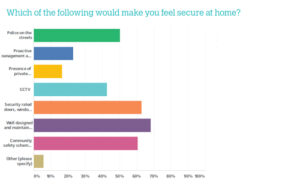 The BRE National Security Survey has revealed that personal security is becoming an increasing worry across the UK, with 2 out of 3 respondents more concerned about crime today than they were 5 years ago. The top three issues raised as causing the most concern were cybercrime, terrorism and property crime.
The BRE National Security Survey has revealed that personal security is becoming an increasing worry across the UK, with 2 out of 3 respondents more concerned about crime today than they were 5 years ago. The top three issues raised as causing the most concern were cybercrime, terrorism and property crime.
Developed by the creators of security assessment and certification scheme SABRE, , the survey was initiated to help understand how people’s perceptions influence their everyday decision-making in relation to their home life, work-life and travel arrangements.
Gavin Jones, Director of SABRE, commented: “Although we are continuing to identify effective ways to protect our built environment from crime and terrorism, these efforts are not necessarily reflected in the general public’s perceptions of their own personal security. Despite the likelihood of an individual being directly affected by a terrorist incident being extremely remote, recent events are having a disproportionate impact on people’s lives; they appear to be influencing where people are willing to travel, where they stay and whether they attend a major event or concert. The public clearly need reassurance that the places they live, work and visit are safe and secure. It is in the interests of businesses that they find innovative solutions to this problem.”
Property crime
Whilst property crime was ranked as the highest security concern, with 43.17% of participants ranking it as a major concern, the vast majority of respondents (87%) felt their homes were either secure or very secure.
One of the key factors identified by the survey in making respondents feel safe and secure at home was well-designed and maintained areas immediately adjacent to their properties. In 2015, security was introduced into building regulations guidance for the first time in the form of a new Approved Document. Approved Document Q ‘Security – Dwellings’ introduces requirements for windows and doors on all dwellings constructed in England. 63% of respondents identified such features as the second most important factor in making them feel secure in their home.
The survey also highlighted the importance of crime and security in influencing the purchasing decisions of home buyers and tenants, with half of respondents stating security was a major influence on their choice of property and a further third believing it would have a minor influence on their decision to purchase or rent.
Cybercrime
In 2016 there were 38% more cyber security incidents than the previous year, whilst 2017 has already seen a number of high-profile incidents, including a direct email hack on the Houses of Parliament and the denial-of-service attack on Lloyds, Halifax and Bank of Scotland, which ran for two days in January. The incident came just months after a serious cyber-heist against Tesco Bank, when £2.5m was lost from 9,000 accounts.
Following the increase in tempo of notable cyberattacks, it is of little surprise to see a quarter of respondents place cybercrime as their highest concern. Despite this, 1 in 5 placed it as their lowest concern which could mean these individuals are either content with existing security controls or are perhaps agnostic to the potential threats posed.
Terrorism
In a year when UK terror arrests rose 68% to record levels, coupled with a string of large-scale attacks across the UK and Europe, terrorism has been a regular feature of daily news broadcasts and social media feeds. This notoriety has undoubtedly led to increased concern around the issue, with two-thirds of respondents to the survey stating that recent acts of terrorism have led them to become more security-conscious when out and about.
In terms of security in the workplace over 80% of respondents felt either secure or very secure at their place of work. The vast majority of respondents stated that they hold their employers responsible for their safety whilst at work (83%), with nearly three-quarters recognising their own role in workplace security.
When asked what types of security measures would make them feel more secure at work, at the top of the list was a desire to see proactive management and regular security updates to employees (over 58%). Security rated windows/doors and CCTV installations came 2nd and 3rd place respectively.

